The Havana Declaration Broke International Silence on the War in Ukraine — Patriarch Sviatoslav (Shevchuk)
Sunday, 05 February 2017, 17:28 Last year, the meeting in Cuba between Pope Francis and Patriarch Kirill and the signing of a common Declaration upset Ukrainian society. While international journalists and experts were calling it a unique historic event, the mood in Ukraine was more pessimistic. Some of the points of the Declaration pertained to the war in Ukraine and the activity of the Ukrainian Greek-Catholic Church. In the opinion of many, the Declaration was vaguely worded that it facilitated a pro-Russian interpretation of ecclesial or political realities. Many Greek-Catholics saw a sign of hope in the fact that Patriarch Sviatoslav (Shevchuk) did not hide behind diplomatic formulae, but intervened courageously by giving voice to their sorrows, posing important, poignant questions to the Apostolic See and to the Pope himself. A year on, many things have changed. Sometimes, it looks as if, referring to the bloody war in Syria as “sacred”, the Patriarch of Moscow lost all the moral credit that he had acquired at Havana. However, others see that meeting as the beginning of a greater initiative. Perhaps it is too early to evaluate its results but RISU has taken advantage of the anniversary to pose questions to the Head of the UGCC about the Havana meeting and accord, and the developments that have happened in the year since it occurred.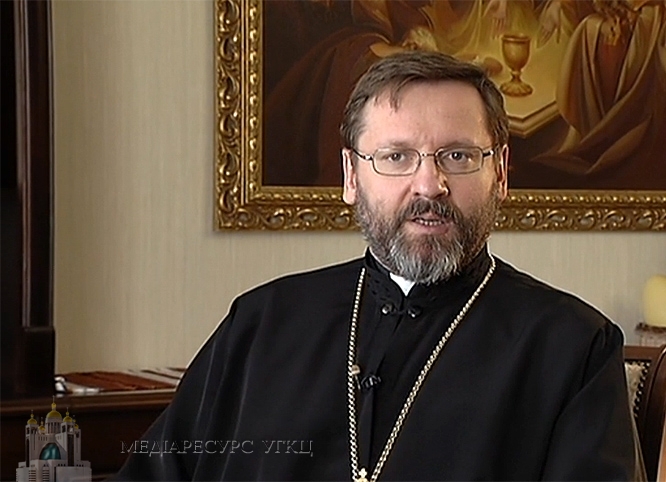
-
See also:
- Shameless theft at the state level, - His Beatitude Sviatoslav on Russia’s attempted annexation of four regions of Ukraine
- War denies the paramount human right – to life, - the Head of the UGCC at the meeting of the VRCiRO with the ombudsman
- From the Head of the UGCC at the Kyiv Three Saints Theological Seminary: We are starting the new academic year with great trust in the Lord
Your Beatitude, a year has elapsed since the meeting between Pope Francis and Patriarch Kirill and the Havana Declaration which they signed. This event, or rather the document itself, provoked varying responses in Ukrainian society. Over the past year, there have been many developments in the Church and in society. How does that event look in the hindsight of the past year?
— What happened a year ago took us completely by surprise, but it also served as a lesson and an opportunity. First of all, it was a surprise to us that the pastoral activity of the UGCC had not constituted an obstacle for a meeting between the Patriarch of Moscow and the Holy Father as, previously, the Patriarchate of Moscow cited it as a reason for rejecting such a meeting. Therefore, we could only welcome the meeting itself, a meeting which Saint John Paul II, and Pope Benedict XVI both desired and worked toward. Through encounters, God changes people. And we celebrate such encounters in the Nativity of Christ and on the upcoming Feast of the Presentation of the Lord [ed. also known as “The Encounter”].
We have to recognize that Pope Francis has a strong impact on the contemporary world. Without being naive, we might suggest that the first anniversary of the encounter is still to early to judge the results of this process. Last year, the really bitter surprise was that, during the meeting, a Declaration was signed that our Church did not participate in preparing and in which there were points that pertained to us directly. It was precisely those points that caused alarm among our faithful, and Ukrainian society in general. Therefore, following the publication of that text, I felt obligated to respond to the anxieties of our faithful, and also to explain personally to the Holy Father which parts of the text, in our opinion, were not entirely correct: specifically, in describing the situation in Ukraine, and in particular, describing Orthodox-Catholic relations.
An important result of the Havana encounter was that our Church initiated a conversation with the Apostolic See [on these points]. Certainly, even before this event, we always strove to inform the Vatican regarding the truth concerning the war in Ukraine. Nevertheless, after Havana, the global community was able perceive to see our distress once again, by being reminded of the “forgotten war” in Ukraine. Our pleas also resounded anew in the Vatican. And in encounters, appeals, and letters, myself, the Permanent Synod of our Church, and the Synod of the worldwide Episcopate strove to explain our position with a united voice, in explaining which elements of the Declaration had caused hurt. I would like to say that, to all of our appeals, the Holy Father himself and his collaborators were very serious and attentive.
The Pope’s interest and also personal solidarity with the suffering people of Ukraine resulted in his humanitarian aid initiative called “The Pope for Ukraine.” Perhaps he had been contemplating it in his heart log before, but I believe that it definitively came to fruition after the meeting between the Pope and the bishops of our Permanent Synod. On that occasion, we said: “Holy Father! We know that you understand Ukrainians’ sufferings and that Ukraine is an innocent victim of aggression. Give us a visible sign for those suffering most!.” This humanitarian aid, which the Pope initiated by giving a considerable sum of his personal funds, became that sign. His next step was to appeal to all the Catholics of Europe to take up a collection for the needs of the victims of the war in Ukraine. This appeal received not only a material dimension: The Pope decisively broke the silence, which had fallen upon Western Europe for some reason, about the war in Donbas. And this represented such a significant help that we have yet to fully understand and evaluate it.
The Vatican Secretariat of State began to take a closer interest in the particular social processes in Ukraine, especially the humanitarian situation. Here we should remember that, last year, Cardinal Pietro Parolin, Vatican Secretary of State, made a fruitful, official visit to Ukraine. He presides over the papal diplomatic service and his visit, to personally inaugurate of the humanitarian papal mission in Ukraine, was an event representing highest state level for the Apostolic See. I had the impression that Ukrainian society did not completely comprehend the [diplomatic] level and importance of such a visit, its symbolism and the positive repercussions for our country. His Eminence visited the Maidan and paid homage to the fallen heroes of the Heavenly Hundred; which caused a storm of emotion in Moscow.
I can affirm that Pope Francis personally acted to increase the level of interest in Ukraine. Therefore, the encounter between the Pope and the Patriarch in Cuba simultaneously represented a challenge and an opportunity for our Church and for Ukrainian society.
— You have rightly noted the ambiguous perception in Ukraine and the Ukrainian diaspora toward the Declaration, but perhaps the displeased voices, in particular your personal criticism, have also been ambiguously perceived in the Vatican?
-— Yes, you are right. Some considered my words to be too harsh. But the first person to come to my defense was Pope Francis himself. Even today, I am moved when I remember his interview f the place from Mexico to Rome… I was and am still taken aback by the humility of the Holy Father. With great freedom and sincerity he supported me and said that, not only could I have reacted, but that I should to have reacted to the text of the Declaration. Besides this, he affirmed that that the Declaration’s text was not infallible, that it is not “a page of the Gospel”. It should be underestimated but it should also not be exaggerated. We can and should criticize it. This pertains not to abstract agreements or schemas, but to the destiny of our Church and of my personal responsibility to the faithful and civil society. When I spoke about the suffering a year ago, I was not speaking myself but, rather, as the voice of Ukrainian society, the wounds of which had been aggravated by the Declaration or by its interpretation.
Our bishops spoke intensely and in complete frankness with Cardinal Kurt Koch, President of the Pontifical Counsel for Christian Unity. I hope that our ecumenical position will be fully considered by its experts, at that the study of the ecumenical context of Ukraine will be seriously taken into consideration.
— Recently, on Ukrainian social media, the opinion spreading that the pro-Russian politik of the Vatican and also that the UGCC should oppose the Pope in the name of national interests. How would you comment on that opinion?
— Well, if we do not have our own politik, we will have somebody else’s imposed upon us! I say this because, unfortunately, today I do not see a clear plan to further relations between Ukraine and the Vatican. The question of state politics lies outside of the competence of the Church’s sphere of influence, although this does not mean that we should not take a position as citizens, in this regard. And we are expressing that position. Perhaps to some, it might appear that we express it too often and too courageously.
We have witnessed how our Northern neighbour actively attempts to impose itself on the Holy See and seeks to manipulate and use it to its advantage. Even in the interpretation and political use of the Havana Declaration, throughout the previous year, we can see Moscow’s proactive politik to this end. On the other hand, we have the impression that Ukrainian authorities are still unable to value the importance of relations with the Vatican, for our national interests. Even in the media, as you correctly noted, on the contrary, we hear hostile opinions regarding the Vatican. Personally, I am profoundly convinced that those who are seeking to place enmity between Ukraine and the Holy See, or to create the impression in Ukrainian society that the Vatican “is making friends with Moscow” against Ukraine, it the force that is really acting against our national interests.
Many times throughout history we have endured numerous attempts by politicians and various ideologues to turn our Church against the Vatican. Here I want to emphasize that the unity of our Church with the Holy Father is not based on mere political or diplomatic convenience. This unity with the Universal Hierarch constitutes the recognition of the particular role of the Successor of the Apostle Peter, the Pope, in the Church of Christ. It is an object of our faith and is an integral part of the identity of our Church. We are dealing with that unity and that faith that the martyrs and confessors of out Church witnessed with their own blood, especially in the twentieth century. I vividly remember, during Soviet times, when Communist propaganda was trying to convince our people that the Vatican and the Pope were enemies of the Ukrainian people, a old woman very simply said: “Let those people say what they want, but we were always and will always be with the Pope.” Only now do I understand that that was a true and authentic confession, by our people, of the Christian Faith. It is particularly important that we all remember this witness today.
It is worth remembering the role played by the Roman Pontiffs in recent Ukrainian history. Pope Pius XII strongly condemned Soviet atheist aggression and the destruction of the UGCC while, at the same time, rescuing tens of thousands of Ukrainian immigrants from being “repatriated” to Siberia. Then, a short time later, Rome erected eparchies and exarchates for Ukrainians on various continents. This was fundamental in sustaining Ukrainians throughout the world. After the Second World War, the Vatican and Roman Catholics not only supported church structures and charitable work, but also became a major promoter of Ukrainian culture in Europe. For example, it supported the authors of “The Encyclopedia of Ukrainian Studies,” which was created at Sarcelles near Paris, by the Ukrainian Free University of Munich and the Ukrainian Catholic University in Rome. Pope Saint John XXIII was involved in the release of Patriarch Yosyf Slipyi, who became the greatest Ukrainian ambassador in the free world and vitally influenced the course of Ukrainian history. We cannot exaggerate the role played in our history by Saint John Paul II, who contributed to the fall of the Communist regime. Being the most respected world leader, he frequently spoke in Ukrainian during his 27-year pontificate. Has there every been a world leader that took such a positive stance toward our language, our culture, and our history? Pope Benedict XVI continued this tradition, clearing expressing himself on totalitarianism and on the historical truth regarding Ukrainian events. Pope Francis also maintains this stance. The Holy father is a moral leader for the world and Vatican diplomacy today is an important subject of international law. The embassies to the Vatican are among the most important spaces of dialogue and influence upon world opinion. It is no accident that the Russian Federation invests so many resources in its relations with the Vatican, whereas our voice is sometimes simply insufficient.
We are convinced that in the difficult time for Ukraine, we need to make every possible effort, in order that the relationship between our country and the Holy See develop efficaciously. On the strategic plane, our great desire is to work toward the stipulation of a concordat– a comprehensive international accord between Ukraine and the Vatican.
— And yet, we have not hear a clear condemnation of Russia’s war against Ukraine, either from the Pope or from his diplomatic representatives. No one has called the aggressor by that name. On the contrary, we have heard the theory of a “fratricidal conflict” and that “no one knows who started it”. We have not fully heard that the Vatican has unequivocally sided with the victim of this conflict and that it expressed itself in support of he sovereignty and territorial integrity of Ukraine. Or are these statements only the result of the lack of proper communication?
— In answer to your question, I would like to remind everyone that, during his visit, Cardinal Parolin clearly affirmed that the conflict in Ukraine must be resolved on the basis of international law. This means that the Holy See recognizes that the war in Ukraine as an external aggression and not as an internal civil war. The Vatican has never recognized the annexation of Crimea, even if it has not directly addressed this question. The Secretary of State also made an appeal at Zaporizhia to the nations of Europe and to Russia, to maintain their international obligations to Ukraine. In other words, on behalf of the Vatican, everything that you said was affirmed but in the language of Vatican diplomacy, which differs in style from that of civil states.
Affirming the fact, in this manner, of an external aggression against a sovereign state is nothing new. Rather, it corresponds to the traditions and language of Vatican diplomacy. In this context, we should remember the visit of John Paul II to Lebanon in 1997. At that time, the Syrian and Israeli armies were still in the country, a fact that was obvious to the international community. Nevertheless, even then, speaking of the desire for independence and of freedom for Lebanon, the Holy Father did not mention the Syrians or the Israelis by name. He merely alluded to the fact that the integrity of the Lebanese borders must be recognized by everyone and must be respected. But everyone present understood what he was talking about…
Regarding on which side the Holy See unequivocally stands … The fact is that, from the First Millennium, the Pope and the Holy Apostolic See were considered the highest arbiter and mediator for resolving interchurch conflicts and those between countries, the highest court of appeal in the quest for justice. Therefore, in the face of conflicts, the Vatican take the position which corresponds to its mission and its traditions. A mediator cannot take the side of any one of the parties in conflict. It must remain above them, in order to function as an intermediary between the parties and to help to implement a just peace. That kind of mission requires the arbiter to maintain relations with each of the parties in conflict, never allowing itself to be “influenced” by any side. Otherwise its final verdict will not be just. Obviously, such mediation requires that both sides of the conflict accept the mediation of the arbiter; it requires that that they desire it and that, afterwards, they obligate themselves to follow its decisions.
In recent years, we have heard request to the Vatican from our state officials, for mediation to resolve the war in Donbas in a diplomatic way, and for the liberation of our hostages. And we have also asked for the protection of our parishes in Crimea.
For the moment, such a Vatican mission to mediate between Russia and Ukraine is not taking place, but the Holy See’s diplomatic stance intends, precisely, to be such a mission. My observations regarding the risks of the Havana Accord also pertained to the possibility that Moscow might try to manipulate the Holy Father and place him “on their side.” This is an aspect of the hybrid [information] war against Ukraine. In such a case, the Holy See would no longer be above the conflict but would become party to it by taking the position of one of the two parties.
I would like to affirm that, in my opinion, Vatican diplomacy has succeeded in remaining above the conflict, for the moment, even though this has irritated Moscow and disappointed us. Obviously, we would have wanted the Holy See to place itself unequivocally and exclusively on our side. And, precisely for this reason, we hear the criticism that the Vatican is insufficiently clear in its position. Nevertheless, even we should not give in to the temptation to manipulate the Apostolic See and not appreciate its diplomatic efforts in favour of our national interests, in as much as we are able.
In the other hand, the role and duty of the UGCC, as a local Eastern Catholic Church sui iuris, is a little different. We have always stood and will always stand on the side of our people. We will defend them and we will defend their rights. We are aware of out obligation to take care of those whom the Lord has entrusted to our pastoral case and to raise our voice in their name, appealing to the Holy Father and to Christians throughout the world. Our mission is precisely that of sanctifying this people of God with the word of Christ’s Truth, to cultivate in them faith in God, to correct their faults and to educate them in Christian virtue, in particular the virtue of true Christian patriotism and those other civic virtues necessary to strengthen and develop the independent Ukrainian state. Our mission is precisely that of being with our military on the field of battle, near the hospital bed with the sick and wounded, caring for refugees and the internally displaced, helping the poor and those that have nothing with which to buy their daily bread. Our mission is precisely that of cultivating a missionary spirit and preaching the Gospel to all people.
Our view of the state and of the conditions I which our people live today can be distinguished from the understanding or idea of Ukraine which various Vatican offices have. Since our point of view comes from within and theirs comes from without, our point of view is formed from a daily dialogue with out people, whereas theirs is formed on the basis of the global challenges of humanity. Therefore, it is so important for the Holy See’s officials take into account views of the local pastors. Pope Francis understands this very well because, for many years he was the head of the Argentinian bishops, and he too was not immediately understood in certain Vatican departments.
As to the question of the war in Ukraine, the Holy See did not placed itself so much on the side of the state, but rather on the side of the victims of the war. This is a natural characteristic of its particular diplomacy. Let us allow the Vatican to be itself and to carry out its own special mission, as regards our affairs, while we are to carry out our part of the mission. Let us be patient: let us defend out legitimate rights, fight for the truth, and be true to ourselves!
— But Your Beatitude, even Patriarch Kirill of di Moscow says that he stands “above” the conflict and also emphasizes that, in acting thus, he is in full solidarity with the Pope. The Apostolic See remains silent, as regards to such a declaration. It seems to me that this causes many doubts in Ukrainian, in that we all remember well Kirill’s homilies about the “Russian World”, under the auspices of which appeared all these Girkin e Babai [militant Russian leaders in Donbas].
-— Personally, I believe that such an affirmation is simply not serious. It is nothing other than mimicry, that is, an attempt by the Patriarchate of Moscow to impose upon the world an image of Moscow as the “Third Rome.” In reality, the Patriarchate of Moscow is just another local Church, one among many. It was never a universal mediator, not even in the Orthodox world. Moreover, it always negated that the Roman Papacy had any role as a Universal hierarch. For the Patriarch of Moscow to thus aspire to the role of Universal Hierarch seems to be a negation of its own ecclesiology, as formulated by itself. And this is true from a theological or a canonical point of view.
If one takes into account the fact that Russia itself is the aggressor toward Ukraine, while the Russian Orthodox Church positions itself as the Church that consequently defends its Russian state interests, then to imagine itself as “above the conflict” is merely a negation of the obvious. This Church can act as a mediator only if we are dealing with and internal Russian conflict, a war between the subjects of the Russian Federation or an internal war between the individual members of the Russian Orthodox Church. Perhaps we are witnessing, here again, the manifestation of a certain “geopolitical subconscious” where, instead of Ukrainians and without Ukrainians, Ukraine is incorporated into the “Russian World” without the chance to appeal. Perhaps they see the war against us as an integral conflict within this “World”. In reality, the war against Ukraine, as an independent sovereign state, violates international law, as the Holy See specifically declared. Meanwhile, the Holy Father carries out his ministry as Universal Hierarch, according to the ancient tradition of the First Millennium of Christianity.
— And how do you evaluate of the recent visits of Apostolic Nuncio Claudio Gugerotti to the Donbas region?
— Here it is important to emphasize that he went to this territory in fulfillment of the will of the Pope, and thus testified that it is part of Ukraine, because he is the papal ambassador exclusively for Ukraine. Archbishop Claudio Gugerotti truly helped and continues to help us with the pastoral care of our priests and faithful that remain in the occupied territories, and which neither myself nor their bishop can go to visit at this time.
I do not share the opinion of those who believe that all the people in the occupied territories are enemies of Ukraine. Of course are people who have taken up arms and are collaborating, but the level of their guilt and their destiny will be decided by a tribunal. Nevertheless, the majority of the inhabitants are simple people who have become the instruments of criminals. This reminds me of the propaganda of Stalin, who held that those who had been the territories occupied by the Germans, and those taken hostage during the Second World War, were all enemies of the people. We must fight, not against these simple people who look for protection and spiritual support from our priests, but for them! Those among our priests who, like the Good Shepherd, have not abandoned their flocks in Donetsk e Luhansk, merit respect and every support. Our Exarch of Donetsk, Bishop Stepan Meniok, was put on the “list of those to be shot” and, for the present, cannot cross the border to visit these communities. Thus, we are grateful to Archbishop Claudio for having taken upon himself the pastoral responsibility of visiting our people.
— Perhaps you would like to add a message for our readers?
— To conclude, I would like to thank all of our faithful in Ukraine and beyond its borders, for the love that they have given toward their Church and to their people, for their prayer and for work involving personal sacrifice, for the welfare of Ukraine. I am truly inspired by the testimony of those who are defending our dignity and our liberty, who sacrifice their own lives, and by the enormous volunteer movement. I am inspired by various manifestations of international solidarity on the part of Ukrainians of the diaspora, as well as by those who support us with their prayer and with systematic material support. Together we constitute a great spiritual power. We have no doubt that God is with us. The truth is with us, international law, and God’s closeness to those who suffer. There is much work still ahead. But I am convinced that, with the help of God, we can achieve everything and together, with common efforts, we will win a just peace for Ukraine!
— trans. A. McVayYour Beatitude, a year has elapsed since the meeting between Pope Francis and Patriarch Kirill and the Havana Declaration which they signed. This event, or rather the document itself, provoked varying responses in Ukrainian society. Over the past year, there have been many developments in the Church and in society. How does that event look in the hindsight of the past year?
— What happened a year ago took us completely by surprise, but it also served as a lesson and an opportunity. First of all, it was a surprise to us that the pastoral activity of the UGCC had not constituted an obstacle for a meeting between the Patriarch of Moscow and the Holy Father as, previously, the Patriarchate of Moscow cited it as a reason for rejecting such a meeting. Therefore, we could only welcome the meeting itself, a meeting which Saint John Paul II, and Pope Benedict XVI both desired and worked toward. Through encounters, God changes people. And we celebrate such encounters in the Nativity of Christ and on the upcoming Feast of the Presentation of the Lord [ed. also known as “The Encounter”].
We have to recognize that Pope Francis has a strong impact on the contemporary world. Without being naive, we might suggest that the first anniversary of the encounter is still to early to judge the results of this process. Last year, the really bitter surprise was that, during the meeting, a Declaration was signed that our Church did not participate in preparing and in which there were points that pertained to us directly. It was precisely those points that caused alarm among our faithful, and Ukrainian society in general. Therefore, following the publication of that text, I felt obligated to respond to the anxieties of our faithful, and also to explain personally to the Holy Father which parts of the text, in our opinion, were not entirely correct: specifically, in describing the situation in Ukraine, and in particular, describing Orthodox-Catholic relations.
An important result of the Havana encounter was that our Church initiated a conversation with the Apostolic See [on these points]. Certainly, even before this event, we always strove to inform the Vatican regarding the truth concerning the war in Ukraine. Nevertheless, after Havana, the global community was able perceive to see our distress once again, by being reminded of the “forgotten war” in Ukraine. Our pleas also resounded anew in the Vatican. And in encounters, appeals, and letters, myself, the Permanent Synod of our Church, and the Synod of the worldwide Episcopate strove to explain our position with a united voice, in explaining which elements of the Declaration had caused hurt. I would like to say that, to all of our appeals, the Holy Father himself and his collaborators were very serious and attentive.
The Pope’s interest and also personal solidarity with the suffering people of Ukraine resulted in his humanitarian aid initiative called “The Pope for Ukraine.” Perhaps he had been contemplating it in his heart log before, but I believe that it definitively came to fruition after the meeting between the Pope and the bishops of our Permanent Synod. On that occasion, we said: “Holy Father! We know that you understand Ukrainians’ sufferings and that Ukraine is an innocent victim of aggression. Give us a visible sign for those suffering most!.” This humanitarian aid, which the Pope initiated by giving a considerable sum of his personal funds, became that sign. His next step was to appeal to all the Catholics of Europe to take up a collection for the needs of the victims of the war in Ukraine. This appeal received not only a material dimension: The Pope decisively broke the silence, which had fallen upon Western Europe for some reason, about the war in Donbas. And this represented such a significant help that we have yet to fully understand and evaluate it.
The Vatican Secretariat of State began to take a closer interest in the particular social processes in Ukraine, especially the humanitarian situation. Here we should remember that, last year, Cardinal Pietro Parolin, Vatican Secretary of State, made a fruitful, official visit to Ukraine. He presides over the papal diplomatic service and his visit, to personally inaugurate of the humanitarian papal mission in Ukraine, was an event representing highest state level for the Apostolic See. I had the impression that Ukrainian society did not completely comprehend the [diplomatic] level and importance of such a visit, its symbolism and the positive repercussions for our country. His Eminence visited the Maidan and paid homage to the fallen heroes of the Heavenly Hundred; which caused a storm of emotion in Moscow.
I can affirm that Pope Francis personally acted to increase the level of interest in Ukraine. Therefore, the encounter between the Pope and the Patriarch in Cuba simultaneously represented a challenge and an opportunity for our Church and for Ukrainian society.
— You have rightly noted the ambiguous perception in Ukraine and the Ukrainian diaspora toward the Declaration, but perhaps the displeased voices, in particular your personal criticism, have also been ambiguously perceived in the Vatican?
-— Yes, you are right. Some considered my words to be too harsh. But the first person to come to my defense was Pope Francis himself. Even today, I am moved when I remember his interview f the place from Mexico to Rome… I was and am still taken aback by the humility of the Holy Father. With great freedom and sincerity he supported me and said that, not only could I have reacted, but that I should to have reacted to the text of the Declaration. Besides this, he affirmed that that the Declaration’s text was not infallible, that it is not “a page of the Gospel”. It should be underestimated but it should also not be exaggerated. We can and should criticize it. This pertains not to abstract agreements or schemas, but to the destiny of our Church and of my personal responsibility to the faithful and civil society. When I spoke about the suffering a year ago, I was not speaking myself but, rather, as the voice of Ukrainian society, the wounds of which had been aggravated by the Declaration or by its interpretation.
Our bishops spoke intensely and in complete frankness with Cardinal Kurt Koch, President of the Pontifical Counsel for Christian Unity. I hope that our ecumenical position will be fully considered by its experts, at that the study of the ecumenical context of Ukraine will be seriously taken into consideration.
— Recently, on Ukrainian social media, the opinion spreading that the pro-Russian politik of the Vatican and also that the UGCC should oppose the Pope in the name of national interests. How would you comment on that opinion?
— Well, if we do not have our own politik, we will have somebody else’s imposed upon us! I say this because, unfortunately, today I do not see a clear plan to further relations between Ukraine and the Vatican. The question of state politics lies outside of the competence of the Church’s sphere of influence, although this does not mean that we should not take a position as citizens, in this regard. And we are expressing that position. Perhaps to some, it might appear that we express it too often and too courageously.
We have witnessed how our Northern neighbour actively attempts to impose itself on the Holy See and seeks to manipulate and use it to its advantage. Even in the interpretation and political use of the Havana Declaration, throughout the previous year, we can see Moscow’s proactive politik to this end. On the other hand, we have the impression that Ukrainian authorities are still unable to value the importance of relations with the Vatican, for our national interests. Even in the media, as you correctly noted, on the contrary, we hear hostile opinions regarding the Vatican. Personally, I am profoundly convinced that those who are seeking to place enmity between Ukraine and the Holy See, or to create the impression in Ukrainian society that the Vatican “is making friends with Moscow” against Ukraine, it the force that is really acting against our national interests.
Many times throughout history we have endured numerous attempts by politicians and various ideologues to turn our Church against the Vatican. Here I want to emphasize that the unity of our Church with the Holy Father is not based on mere political or diplomatic convenience. This unity with the Universal Hierarch constitutes the recognition of the particular role of the Successor of the Apostle Peter, the Pope, in the Church of Christ. It is an object of our faith and is an integral part of the identity of our Church. We are dealing with that unity and that faith that the martyrs and confessors of out Church witnessed with their own blood, especially in the twentieth century. I vividly remember, during Soviet times, when Communist propaganda was trying to convince our people that the Vatican and the Pope were enemies of the Ukrainian people, a old woman very simply said: “Let those people say what they want, but we were always and will always be with the Pope.” Only now do I understand that that was a true and authentic confession, by our people, of the Christian Faith. It is particularly important that we all remember this witness today.
It is worth remembering the role played by the Roman Pontiffs in recent Ukrainian history. Pope Pius XII strongly condemned Soviet atheist aggression and the destruction of the UGCC while, at the same time, rescuing tens of thousands of Ukrainian immigrants from being “repatriated” to Siberia. Then, a short time later, Rome erected eparchies and exarchates for Ukrainians on various continents. This was fundamental in sustaining Ukrainians throughout the world. After the Second World War, the Vatican and Roman Catholics not only supported church structures and charitable work, but also became a major promoter of Ukrainian culture in Europe. For example, it supported the authors of “The Encyclopedia of Ukrainian Studies,” which was created at Sarcelles near Paris, by the Ukrainian Free University of Munich and the Ukrainian Catholic University in Rome. Pope Saint John XXIII was involved in the release of Patriarch Yosyf Slipyi, who became the greatest Ukrainian ambassador in the free world and vitally influenced the course of Ukrainian history. We cannot exaggerate the role played in our history by Saint John Paul II, who contributed to the fall of the Communist regime. Being the most respected world leader, he frequently spoke in Ukrainian during his 27-year pontificate. Has there every been a world leader that took such a positive stance toward our language, our culture, and our history? Pope Benedict XVI continued this tradition, clearing expressing himself on totalitarianism and on the historical truth regarding Ukrainian events. Pope Francis also maintains this stance. The Holy father is a moral leader for the world and Vatican diplomacy today is an important subject of international law. The embassies to the Vatican are among the most important spaces of dialogue and influence upon world opinion. It is no accident that the Russian Federation invests so many resources in its relations with the Vatican, whereas our voice is sometimes simply insufficient.
We are convinced that in the difficult time for Ukraine, we need to make every possible effort, in order that the relationship between our country and the Holy See develop efficaciously. On the strategic plane, our great desire is to work toward the stipulation of a concordat– a comprehensive international accord between Ukraine and the Vatican.
— And yet, we have not hear a clear condemnation of Russia’s war against Ukraine, either from the Pope or from his diplomatic representatives. No one has called the aggressor by that name. On the contrary, we have heard the theory of a “fratricidal conflict” and that “no one knows who started it”. We have not fully heard that the Vatican has unequivocally sided with the victim of this conflict and that it expressed itself in support of he sovereignty and territorial integrity of Ukraine. Or are these statements only the result of the lack of proper communication?
— In answer to your question, I would like to remind everyone that, during his visit, Cardinal Parolin clearly affirmed that the conflict in Ukraine must be resolved on the basis of international law. This means that the Holy See recognizes that the war in Ukraine as an external aggression and not as an internal civil war. The Vatican has never recognized the annexation of Crimea, even if it has not directly addressed this question. The Secretary of State also made an appeal at Zaporizhia to the nations of Europe and to Russia, to maintain their international obligations to Ukraine. In other words, on behalf of the Vatican, everything that you said was affirmed but in the language of Vatican diplomacy, which differs in style from that of civil states.
Affirming the fact, in this manner, of an external aggression against a sovereign state is nothing new. Rather, it corresponds to the traditions and language of Vatican diplomacy. In this context, we should remember the visit of John Paul II to Lebanon in 1997. At that time, the Syrian and Israeli armies were still in the country, a fact that was obvious to the international community. Nevertheless, even then, speaking of the desire for independence and of freedom for Lebanon, the Holy Father did not mention the Syrians or the Israelis by name. He merely alluded to the fact that the integrity of the Lebanese borders must be recognized by everyone and must be respected. But everyone present understood what he was talking about…
Regarding on which side the Holy See unequivocally stands … The fact is that, from the First Millennium, the Pope and the Holy Apostolic See were considered the highest arbiter and mediator for resolving interchurch conflicts and those between countries, the highest court of appeal in the quest for justice. Therefore, in the face of conflicts, the Vatican take the position which corresponds to its mission and its traditions. A mediator cannot take the side of any one of the parties in conflict. It must remain above them, in order to function as an intermediary between the parties and to help to implement a just peace. That kind of mission requires the arbiter to maintain relations with each of the parties in conflict, never allowing itself to be “influenced” by any side. Otherwise its final verdict will not be just. Obviously, such mediation requires that both sides of the conflict accept the mediation of the arbiter; it requires that that they desire it and that, afterwards, they obligate themselves to follow its decisions.
In recent years, we have heard request to the Vatican from our state officials, for mediation to resolve the war in Donbas in a diplomatic way, and for the liberation of our hostages. And we have also asked for the protection of our parishes in Crimea.
For the moment, such a Vatican mission to mediate between Russia and Ukraine is not taking place, but the Holy See’s diplomatic stance intends, precisely, to be such a mission. My observations regarding the risks of the Havana Accord also pertained to the possibility that Moscow might try to manipulate the Holy Father and place him “on their side.” This is an aspect of the hybrid [information] war against Ukraine. In such a case, the Holy See would no longer be above the conflict but would become party to it by taking the position of one of the two parties.
I would like to affirm that, in my opinion, Vatican diplomacy has succeeded in remaining above the conflict, for the moment, even though this has irritated Moscow and disappointed us. Obviously, we would have wanted the Holy See to place itself unequivocally and exclusively on our side. And, precisely for this reason, we hear the criticism that the Vatican is insufficiently clear in its position. Nevertheless, even we should not give in to the temptation to manipulate the Apostolic See and not appreciate its diplomatic efforts in favour of our national interests, in as much as we are able.
In the other hand, the role and duty of the UGCC, as a local Eastern Catholic Church sui iuris, is a little different. We have always stood and will always stand on the side of our people. We will defend them and we will defend their rights. We are aware of out obligation to take care of those whom the Lord has entrusted to our pastoral case and to raise our voice in their name, appealing to the Holy Father and to Christians throughout the world. Our mission is precisely that of sanctifying this people of God with the word of Christ’s Truth, to cultivate in them faith in God, to correct their faults and to educate them in Christian virtue, in particular the virtue of true Christian patriotism and those other civic virtues necessary to strengthen and develop the independent Ukrainian state. Our mission is precisely that of being with our military on the field of battle, near the hospital bed with the sick and wounded, caring for refugees and the internally displaced, helping the poor and those that have nothing with which to buy their daily bread. Our mission is precisely that of cultivating a missionary spirit and preaching the Gospel to all people.
Our view of the state and of the conditions I which our people live today can be distinguished from the understanding or idea of Ukraine which various Vatican offices have. Since our point of view comes from within and theirs comes from without, our point of view is formed from a daily dialogue with out people, whereas theirs is formed on the basis of the global challenges of humanity. Therefore, it is so important for the Holy See’s officials take into account views of the local pastors. Pope Francis understands this very well because, for many years he was the head of the Argentinian bishops, and he too was not immediately understood in certain Vatican departments.
As to the question of the war in Ukraine, the Holy See did not placed itself so much on the side of the state, but rather on the side of the victims of the war. This is a natural characteristic of its particular diplomacy. Let us allow the Vatican to be itself and to carry out its own special mission, as regards our affairs, while we are to carry out our part of the mission. Let us be patient: let us defend out legitimate rights, fight for the truth, and be true to ourselves!
— But Your Beatitude, even Patriarch Kirill of di Moscow says that he stands “above” the conflict and also emphasizes that, in acting thus, he is in full solidarity with the Pope. The Apostolic See remains silent, as regards to such a declaration. It seems to me that this causes many doubts in Ukrainian, in that we all remember well Kirill’s homilies about the “Russian World”, under the auspices of which appeared all these Girkin e Babai [militant Russian leaders in Donbas].
-— Personally, I believe that such an affirmation is simply not serious. It is nothing other than mimicry, that is, an attempt by the Patriarchate of Moscow to impose upon the world an image of Moscow as the “Third Rome.” In reality, the Patriarchate of Moscow is just another local Church, one among many. It was never a universal mediator, not even in the Orthodox world. Moreover, it always negated that the Roman Papacy had any role as a Universal hierarch. For the Patriarch of Moscow to thus aspire to the role of Universal Hierarch seems to be a negation of its own ecclesiology, as formulated by itself. And this is true from a theological or a canonical point of view.
If one takes into account the fact that Russia itself is the aggressor toward Ukraine, while the Russian Orthodox Church positions itself as the Church that consequently defends its Russian state interests, then to imagine itself as “above the conflict” is merely a negation of the obvious. This Church can act as a mediator only if we are dealing with and internal Russian conflict, a war between the subjects of the Russian Federation or an internal war between the individual members of the Russian Orthodox Church. Perhaps we are witnessing, here again, the manifestation of a certain “geopolitical subconscious” where, instead of Ukrainians and without Ukrainians, Ukraine is incorporated into the “Russian World” without the chance to appeal. Perhaps they see the war against us as an integral conflict within this “World”. In reality, the war against Ukraine, as an independent sovereign state, violates international law, as the Holy See specifically declared. Meanwhile, the Holy Father carries out his ministry as Universal Hierarch, according to the ancient tradition of the First Millennium of Christianity.
— And how do you evaluate of the recent visits of Apostolic Nuncio Claudio Gugerotti to the Donbas region?
— Here it is important to emphasize that he went to this territory in fulfillment of the will of the Pope, and thus testified that it is part of Ukraine, because he is the papal ambassador exclusively for Ukraine. Archbishop Claudio Gugerotti truly helped and continues to help us with the pastoral care of our priests and faithful that remain in the occupied territories, and which neither myself nor their bishop can go to visit at this time.
I do not share the opinion of those who believe that all the people in the occupied territories are enemies of Ukraine. Of course are people who have taken up arms and are collaborating, but the level of their guilt and their destiny will be decided by a tribunal. Nevertheless, the majority of the inhabitants are simple people who have become the instruments of criminals. This reminds me of the propaganda of Stalin, who held that those who had been the territories occupied by the Germans, and those taken hostage during the Second World War, were all enemies of the people. We must fight, not against these simple people who look for protection and spiritual support from our priests, but for them! Those among our priests who, like the Good Shepherd, have not abandoned their flocks in Donetsk e Luhansk, merit respect and every support. Our Exarch of Donetsk, Bishop Stepan Meniok, was put on the “list of those to be shot” and, for the present, cannot cross the border to visit these communities. Thus, we are grateful to Archbishop Claudio for having taken upon himself the pastoral responsibility of visiting our people.
— Perhaps you would like to add a message for our readers?
— To conclude, I would like to thank all of our faithful in Ukraine and beyond its borders, for the love that they have given toward their Church and to their people, for their prayer and for work involving personal sacrifice, for the welfare of Ukraine. I am truly inspired by the testimony of those who are defending our dignity and our liberty, who sacrifice their own lives, and by the enormous volunteer movement. I am inspired by various manifestations of international solidarity on the part of Ukrainians of the diaspora, as well as by those who support us with their prayer and with systematic material support. Together we constitute a great spiritual power. We have no doubt that God is with us. The truth is with us, international law, and God’s closeness to those who suffer. There is much work still ahead. But I am convinced that, with the help of God, we can achieve everything and together, with common efforts, we will win a just peace for Ukraine!
— trans. A. McVayYour Beatitude, a year has elapsed since the meeting between Pope Francis and Patriarch Kirill and the Havana Declaration which they signed. This event, or rather the document itself, provoked varying responses in Ukrainian society. Over the past year, there have been many developments in the Church and in society. How does that event look in the hindsight of the past year?
— What happened a year ago took us completely by surprise, but it also served as a lesson and an opportunity. First of all, it was a surprise to us that the pastoral activity of the UGCC had not constituted an obstacle for a meeting between the Patriarch of Moscow and the Holy Father as, previously, the Patriarchate of Moscow cited it as a reason for rejecting such a meeting. Therefore, we could only welcome the meeting itself, a meeting which Saint John Paul II, and Pope Benedict XVI both desired and worked toward. Through encounters, God changes people. And we celebrate such encounters in the Nativity of Christ and on the upcoming Feast of the Presentation of the Lord [ed. also known as “The Encounter”].
We have to recognize that Pope Francis has a strong impact on the contemporary world. Without being naive, we might suggest that the first anniversary of the encounter is still to early to judge the results of this process. Last year, the really bitter surprise was that, during the meeting, a Declaration was signed that our Church did not participate in preparing and in which there were points that pertained to us directly. It was precisely those points that caused alarm among our faithful, and Ukrainian society in general. Therefore, following the publication of that text, I felt obligated to respond to the anxieties of our faithful, and also to explain personally to the Holy Father which parts of the text, in our opinion, were not entirely correct: specifically, in describing the situation in Ukraine, and in particular, describing Orthodox-Catholic relations.
An important result of the Havana encounter was that our Church initiated a conversation with the Apostolic See [on these points]. Certainly, even before this event, we always strove to inform the Vatican regarding the truth concerning the war in Ukraine. Nevertheless, after Havana, the global community was able perceive to see our distress once again, by being reminded of the “forgotten war” in Ukraine. Our pleas also resounded anew in the Vatican. And in encounters, appeals, and letters, myself, the Permanent Synod of our Church, and the Synod of the worldwide Episcopate strove to explain our position with a united voice, in explaining which elements of the Declaration had caused hurt. I would like to say that, to all of our appeals, the Holy Father himself and his collaborators were very serious and attentive.
The Pope’s interest and also personal solidarity with the suffering people of Ukraine resulted in his humanitarian aid initiative called “The Pope for Ukraine.” Perhaps he had been contemplating it in his heart log before, but I believe that it definitively came to fruition after the meeting between the Pope and the bishops of our Permanent Synod. On that occasion, we said: “Holy Father! We know that you understand Ukrainians’ sufferings and that Ukraine is an innocent victim of aggression. Give us a visible sign for those suffering most!.” This humanitarian aid, which the Pope initiated by giving a considerable sum of his personal funds, became that sign. His next step was to appeal to all the Catholics of Europe to take up a collection for the needs of the victims of the war in Ukraine. This appeal received not only a material dimension: The Pope decisively broke the silence, which had fallen upon Western Europe for some reason, about the war in Donbas. And this represented such a significant help that we have yet to fully understand and evaluate it.
The Vatican Secretariat of State began to take a closer interest in the particular social processes in Ukraine, especially the humanitarian situation. Here we should remember that, last year, Cardinal Pietro Parolin, Vatican Secretary of State, made a fruitful, official visit to Ukraine. He presides over the papal diplomatic service and his visit, to personally inaugurate of the humanitarian papal mission in Ukraine, was an event representing highest state level for the Apostolic See. I had the impression that Ukrainian society did not completely comprehend the [diplomatic] level and importance of such a visit, its symbolism and the positive repercussions for our country. His Eminence visited the Maidan and paid homage to the fallen heroes of the Heavenly Hundred; which caused a storm of emotion in Moscow.
I can affirm that Pope Francis personally acted to increase the level of interest in Ukraine. Therefore, the encounter between the Pope and the Patriarch in Cuba simultaneously represented a challenge and an opportunity for our Church and for Ukrainian society.
— You have rightly noted the ambiguous perception in Ukraine and the Ukrainian diaspora toward the Declaration, but perhaps the displeased voices, in particular your personal criticism, have also been ambiguously perceived in the Vatican?
-— Yes, you are right. Some considered my words to be too harsh. But the first person to come to my defense was Pope Francis himself. Even today, I am moved when I remember his interview f the place from Mexico to Rome… I was and am still taken aback by the humility of the Holy Father. With great freedom and sincerity he supported me and said that, not only could I have reacted, but that I should to have reacted to the text of the Declaration. Besides this, he affirmed that that the Declaration’s text was not infallible, that it is not “a page of the Gospel”. It should be underestimated but it should also not be exaggerated. We can and should criticize it. This pertains not to abstract agreements or schemas, but to the destiny of our Church and of my personal responsibility to the faithful and civil society. When I spoke about the suffering a year ago, I was not speaking myself but, rather, as the voice of Ukrainian society, the wounds of which had been aggravated by the Declaration or by its interpretation.
Our bishops spoke intensely and in complete frankness with Cardinal Kurt Koch, President of the Pontifical Counsel for Christian Unity. I hope that our ecumenical position will be fully considered by its experts, at that the study of the ecumenical context of Ukraine will be seriously taken into consideration.
— Recently, on Ukrainian social media, the opinion spreading that the pro-Russian politik of the Vatican and also that the UGCC should oppose the Pope in the name of national interests. How would you comment on that opinion?
— Well, if we do not have our own politik, we will have somebody else’s imposed upon us! I say this because, unfortunately, today I do not see a clear plan to further relations between Ukraine and the Vatican. The question of state politics lies outside of the competence of the Church’s sphere of influence, although this does not mean that we should not take a position as citizens, in this regard. And we are expressing that position. Perhaps to some, it might appear that we express it too often and too courageously.
We have witnessed how our Northern neighbour actively attempts to impose itself on the Holy See and seeks to manipulate and use it to its advantage. Even in the interpretation and political use of the Havana Declaration, throughout the previous year, we can see Moscow’s proactive politik to this end. On the other hand, we have the impression that Ukrainian authorities are still unable to value the importance of relations with the Vatican, for our national interests. Even in the media, as you correctly noted, on the contrary, we hear hostile opinions regarding the Vatican. Personally, I am profoundly convinced that those who are seeking to place enmity between Ukraine and the Holy See, or to create the impression in Ukrainian society that the Vatican “is making friends with Moscow” against Ukraine, it the force that is really acting against our national interests.
Many times throughout history we have endured numerous attempts by politicians and various ideologues to turn our Church against the Vatican. Here I want to emphasize that the unity of our Church with the Holy Father is not based on mere political or diplomatic convenience. This unity with the Universal Hierarch constitutes the recognition of the particular role of the Successor of the Apostle Peter, the Pope, in the Church of Christ. It is an object of our faith and is an integral part of the identity of our Church. We are dealing with that unity and that faith that the martyrs and confessors of out Church witnessed with their own blood, especially in the twentieth century. I vividly remember, during Soviet times, when Communist propaganda was trying to convince our people that the Vatican and the Pope were enemies of the Ukrainian people, a old woman very simply said: “Let those people say what they want, but we were always and will always be with the Pope.” Only now do I understand that that was a true and authentic confession, by our people, of the Christian Faith. It is particularly important that we all remember this witness today.
It is worth remembering the role played by the Roman Pontiffs in recent Ukrainian history. Pope Pius XII strongly condemned Soviet atheist aggression and the destruction of the UGCC while, at the same time, rescuing tens of thousands of Ukrainian immigrants from being “repatriated” to Siberia. Then, a short time later, Rome erected eparchies and exarchates for Ukrainians on various continents. This was fundamental in sustaining Ukrainians throughout the world. After the Second World War, the Vatican and Roman Catholics not only supported church structures and charitable work, but also became a major promoter of Ukrainian culture in Europe. For example, it supported the authors of “The Encyclopedia of Ukrainian Studies,” which was created at Sarcelles near Paris, by the Ukrainian Free University of Munich and the Ukrainian Catholic University in Rome. Pope Saint John XXIII was involved in the release of Patriarch Yosyf Slipyi, who became the greatest Ukrainian ambassador in the free world and vitally influenced the course of Ukrainian history. We cannot exaggerate the role played in our history by Saint John Paul II, who contributed to the fall of the Communist regime. Being the most respected world leader, he frequently spoke in Ukrainian during his 27-year pontificate. Has there every been a world leader that took such a positive stance toward our language, our culture, and our history? Pope Benedict XVI continued this tradition, clearing expressing himself on totalitarianism and on the historical truth regarding Ukrainian events. Pope Francis also maintains this stance. The Holy father is a moral leader for the world and Vatican diplomacy today is an important subject of international law. The embassies to the Vatican are among the most important spaces of dialogue and influence upon world opinion. It is no accident that the Russian Federation invests so many resources in its relations with the Vatican, whereas our voice is sometimes simply insufficient.
We are convinced that in the difficult time for Ukraine, we need to make every possible effort, in order that the relationship between our country and the Holy See develop efficaciously. On the strategic plane, our great desire is to work toward the stipulation of a concordat– a comprehensive international accord between Ukraine and the Vatican.
— And yet, we have not hear a clear condemnation of Russia’s war against Ukraine, either from the Pope or from his diplomatic representatives. No one has called the aggressor by that name. On the contrary, we have heard the theory of a “fratricidal conflict” and that “no one knows who started it”. We have not fully heard that the Vatican has unequivocally sided with the victim of this conflict and that it expressed itself in support of he sovereignty and territorial integrity of Ukraine. Or are these statements only the result of the lack of proper communication?
— In answer to your question, I would like to remind everyone that, during his visit, Cardinal Parolin clearly affirmed that the conflict in Ukraine must be resolved on the basis of international law. This means that the Holy See recognizes that the war in Ukraine as an external aggression and not as an internal civil war. The Vatican has never recognized the annexation of Crimea, even if it has not directly addressed this question. The Secretary of State also made an appeal at Zaporizhia to the nations of Europe and to Russia, to maintain their international obligations to Ukraine. In other words, on behalf of the Vatican, everything that you said was affirmed but in the language of Vatican diplomacy, which differs in style from that of civil states.
Affirming the fact, in this manner, of an external aggression against a sovereign state is nothing new. Rather, it corresponds to the traditions and language of Vatican diplomacy. In this context, we should remember the visit of John Paul II to Lebanon in 1997. At that time, the Syrian and Israeli armies were still in the country, a fact that was obvious to the international community. Nevertheless, even then, speaking of the desire for independence and of freedom for Lebanon, the Holy Father did not mention the Syrians or the Israelis by name. He merely alluded to the fact that the integrity of the Lebanese borders must be recognized by everyone and must be respected. But everyone present understood what he was talking about…
Regarding on which side the Holy See unequivocally stands … The fact is that, from the First Millennium, the Pope and the Holy Apostolic See were considered the highest arbiter and mediator for resolving interchurch conflicts and those between countries, the highest court of appeal in the quest for justice. Therefore, in the face of conflicts, the Vatican take the position which corresponds to its mission and its traditions. A mediator cannot take the side of any one of the parties in conflict. It must remain above them, in order to function as an intermediary between the parties and to help to implement a just peace. That kind of mission requires the arbiter to maintain relations with each of the parties in conflict, never allowing itself to be “influenced” by any side. Otherwise its final verdict will not be just. Obviously, such mediation requires that both sides of the conflict accept the mediation of the arbiter; it requires that that they desire it and that, afterwards, they obligate themselves to follow its decisions.
In recent years, we have heard request to the Vatican from our state officials, for mediation to resolve the war in Donbas in a diplomatic way, and for the liberation of our hostages. And we have also asked for the protection of our parishes in Crimea.
For the moment, such a Vatican mission to mediate between Russia and Ukraine is not taking place, but the Holy See’s diplomatic stance intends, precisely, to be such a mission. My observations regarding the risks of the Havana Accord also pertained to the possibility that Moscow might try to manipulate the Holy Father and place him “on their side.” This is an aspect of the hybrid [information] war against Ukraine. In such a case, the Holy See would no longer be above the conflict but would become party to it by taking the position of one of the two parties.
I would like to affirm that, in my opinion, Vatican diplomacy has succeeded in remaining above the conflict, for the moment, even though this has irritated Moscow and disappointed us. Obviously, we would have wanted the Holy See to place itself unequivocally and exclusively on our side. And, precisely for this reason, we hear the criticism that the Vatican is insufficiently clear in its position. Nevertheless, even we should not give in to the temptation to manipulate the Apostolic See and not appreciate its diplomatic efforts in favour of our national interests, in as much as we are able.
In the other hand, the role and duty of the UGCC, as a local Eastern Catholic Church sui iuris, is a little different. We have always stood and will always stand on the side of our people. We will defend them and we will defend their rights. We are aware of out obligation to take care of those whom the Lord has entrusted to our pastoral case and to raise our voice in their name, appealing to the Holy Father and to Christians throughout the world. Our mission is precisely that of sanctifying this people of God with the word of Christ’s Truth, to cultivate in them faith in God, to correct their faults and to educate them in Christian virtue, in particular the virtue of true Christian patriotism and those other civic virtues necessary to strengthen and develop the independent Ukrainian state. Our mission is precisely that of being with our military on the field of battle, near the hospital bed with the sick and wounded, caring for refugees and the internally displaced, helping the poor and those that have nothing with which to buy their daily bread. Our mission is precisely that of cultivating a missionary spirit and preaching the Gospel to all people.
Our view of the state and of the conditions I which our people live today can be distinguished from the understanding or idea of Ukraine which various Vatican offices have. Since our point of view comes from within and theirs comes from without, our point of view is formed from a daily dialogue with out people, whereas theirs is formed on the basis of the global challenges of humanity. Therefore, it is so important for the Holy See’s officials take into account views of the local pastors. Pope Francis understands this very well because, for many years he was the head of the Argentinian bishops, and he too was not immediately understood in certain Vatican departments.
As to the question of the war in Ukraine, the Holy See did not placed itself so much on the side of the state, but rather on the side of the victims of the war. This is a natural characteristic of its particular diplomacy. Let us allow the Vatican to be itself and to carry out its own special mission, as regards our affairs, while we are to carry out our part of the mission. Let us be patient: let us defend out legitimate rights, fight for the truth, and be true to ourselves!
— But Your Beatitude, even Patriarch Kirill of di Moscow says that he stands “above” the conflict and also emphasizes that, in acting thus, he is in full solidarity with the Pope. The Apostolic See remains silent, as regards to such a declaration. It seems to me that this causes many doubts in Ukrainian, in that we all remember well Kirill’s homilies about the “Russian World”, under the auspices of which appeared all these Girkin e Babai [militant Russian leaders in Donbas].
-— Personally, I believe that such an affirmation is simply not serious. It is nothing other than mimicry, that is, an attempt by the Patriarchate of Moscow to impose upon the world an image of Moscow as the “Third Rome.” In reality, the Patriarchate of Moscow is just another local Church, one among many. It was never a universal mediator, not even in the Orthodox world. Moreover, it always negated that the Roman Papacy had any role as a Universal hierarch. For the Patriarch of Moscow to thus aspire to the role of Universal Hierarch seems to be a negation of its own ecclesiology, as formulated by itself. And this is true from a theological or a canonical point of view.
If one takes into account the fact that Russia itself is the aggressor toward Ukraine, while the Russian Orthodox Church positions itself as the Church that consequently defends its Russian state interests, then to imagine itself as “above the conflict” is merely a negation of the obvious. This Church can act as a mediator only if we are dealing with and internal Russian conflict, a war between the subjects of the Russian Federation or an internal war between the individual members of the Russian Orthodox Church. Perhaps we are witnessing, here again, the manifestation of a certain “geopolitical subconscious” where, instead of Ukrainians and without Ukrainians, Ukraine is incorporated into the “Russian World” without the chance to appeal. Perhaps they see the war against us as an integral conflict within this “World”. In reality, the war against Ukraine, as an independent sovereign state, violates international law, as the Holy See specifically declared. Meanwhile, the Holy Father carries out his ministry as Universal Hierarch, according to the ancient tradition of the First Millennium of Christianity.
— And how do you evaluate of the recent visits of Apostolic Nuncio Claudio Gugerotti to the Donbas region?
— Here it is important to emphasize that he went to this territory in fulfillment of the will of the Pope, and thus testified that it is part of Ukraine, because he is the papal ambassador exclusively for Ukraine. Archbishop Claudio Gugerotti truly helped and continues to help us with the pastoral care of our priests and faithful that remain in the occupied territories, and which neither myself nor their bishop can go to visit at this time.
I do not share the opinion of those who believe that all the people in the occupied territories are enemies of Ukraine. Of course are people who have taken up arms and are collaborating, but the level of their guilt and their destiny will be decided by a tribunal. Nevertheless, the majority of the inhabitants are simple people who have become the instruments of criminals. This reminds me of the propaganda of Stalin, who held that those who had been the territories occupied by the Germans, and those taken hostage during the Second World War, were all enemies of the people. We must fight, not against these simple people who look for protection and spiritual support from our priests, but for them! Those among our priests who, like the Good Shepherd, have not abandoned their flocks in Donetsk e Luhansk, merit respect and every support. Our Exarch of Donetsk, Bishop Stepan Meniok, was put on the “list of those to be shot” and, for the present, cannot cross the border to visit these communities. Thus, we are grateful to Archbishop Claudio for having taken upon himself the pastoral responsibility of visiting our people.
— Perhaps you would like to add a message for our readers?
— To conclude, I would like to thank all of our faithful in Ukraine and beyond its borders, for the love that they have given toward their Church and to their people, for their prayer and for work involving personal sacrifice, for the welfare of Ukraine. I am truly inspired by the testimony of those who are defending our dignity and our liberty, who sacrifice their own lives, and by the enormous volunteer movement. I am inspired by various manifestations of international solidarity on the part of Ukrainians of the diaspora, as well as by those who support us with their prayer and with systematic material support. Together we constitute a great spiritual power. We have no doubt that God is with us. The truth is with us, international law, and God’s closeness to those who suffer. There is much work still ahead. But I am convinced that, with the help of God, we can achieve everything and together, with common efforts, we will win a just peace for Ukraine!
— trans. A. McVay
Source:RISU

We can imagine what the prayer of the prisoners in the Russian torture centers in the Ukrainian Kharkiv region was like – Head of the UGCC on the 206th day of the war 17 September
A vast cemetery, a mass burial, was found near the city of Izyum, in which more than 400 innocently killed and tortured people have already been...
-
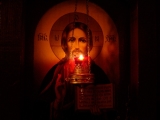 Глава УГКЦ у 158-й день війни: «Нехай Господь прийме з уст нашої Церкви псалми та моління за всіх тих, які особливо просять нашої молитви»
Глава УГКЦ у 158-й день війни: «Нехай Господь прийме з уст нашої Церкви псалми та моління за всіх тих, які особливо просять нашої молитви»
-
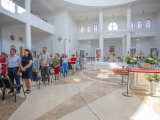 «Сила, яка походить із вірності Христові, є стержнем, який ніхто не може зламати», – Блаженніший Святослав
«Сила, яка походить із вірності Христові, є стержнем, який ніхто не може зламати», – Блаженніший Святослав
-
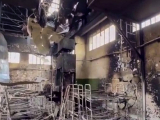 Глава УГКЦ у 157-й день війни: «В ім’я Боже ми засуджуємо звірства в Оленівці і світ повинен це засудити як особливий вияв дикості й жорстокості»
Глава УГКЦ у 157-й день війни: «В ім’я Боже ми засуджуємо звірства в Оленівці і світ повинен це засудити як особливий вияв дикості й жорстокості»
-
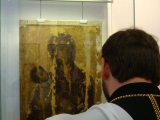 «Боже, почуй наш плач і поспіши нам на допомогу і порятунок!», – Глава УГКЦ у 156-й день війни
«Боже, почуй наш плач і поспіши нам на допомогу і порятунок!», – Глава УГКЦ у 156-й день війни
-
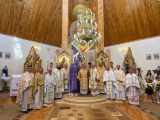 «Бог йому дав серце і душу українського народу»: відбулася щорічна проща до Прилбичів з нагоди уродин митрополита Андрея Шептицького
«Бог йому дав серце і душу українського народу»: відбулася щорічна проща до Прилбичів з нагоди уродин митрополита Андрея Шептицького
-
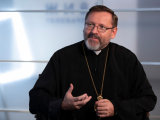 Глава УГКЦ: «Я горджуся українськими патріотами, які без найменшої краплі ненависті готові захищати своє»
Глава УГКЦ: «Я горджуся українськими патріотами, які без найменшої краплі ненависті готові захищати своє»
-
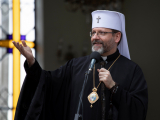 Блаженніший Святослав закликав українську молодь скласти присягу на вірність Христові
Блаженніший Святослав закликав українську молодь скласти присягу на вірність Христові
-
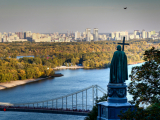 Глава УГКЦ у 155-й день війни: «Помолімося, щоб не втратити скарбу віри князя Володимира»
Глава УГКЦ у 155-й день війни: «Помолімося, щоб не втратити скарбу віри князя Володимира»
-
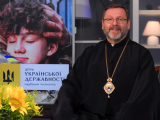 Блаженніший Святослав у День державності України: «Наша Держава – це для нас питання життя або смерті»
Блаженніший Святослав у День державності України: «Наша Держава – це для нас питання життя або смерті»
-
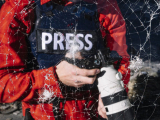 Глава УГКЦ у 154-й день війни: «Нехай Господь Бог прийме у свої вічні обійми журналістів, які віддали за правду своє життя в Україні»
Глава УГКЦ у 154-й день війни: «Нехай Господь Бог прийме у свої вічні обійми журналістів, які віддали за правду своє життя в Україні»
-
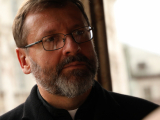 Глава УГКЦ у 153-й день війни: «Принесімо наш біль перед Боже обличчя і будьмо певні, що Він нас вислухає»
Глава УГКЦ у 153-й день війни: «Принесімо наш біль перед Боже обличчя і будьмо певні, що Він нас вислухає»
-
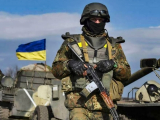 Глава УГКЦ у 152-й день війни: «Помолімся молитву заступництва за наших воїнів»
Глава УГКЦ у 152-й день війни: «Помолімся молитву заступництва за наших воїнів»
-
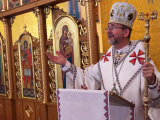 «Віруюча людина не може бути байдужою, коли бачить страждання іншої людини», – владика Богдан Дзюрах
«Віруюча людина не може бути байдужою, коли бачить страждання іншої людини», – владика Богдан Дзюрах
-
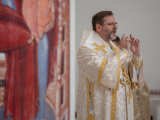 «Серед нашого страждання творімо простір для прояву Божої всемогутності», – Глава УГКЦ у 6-ту неділю після П’ятдесятниці
«Серед нашого страждання творімо простір для прояву Божої всемогутності», – Глава УГКЦ у 6-ту неділю після П’ятдесятниці
-
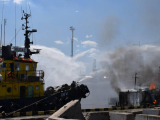 Глава УГКЦ у 151-й день війни: «Російське віроломство ми перемагаємо силою любові до нашої Батьківщини»
Глава УГКЦ у 151-й день війни: «Російське віроломство ми перемагаємо силою любові до нашої Батьківщини»

